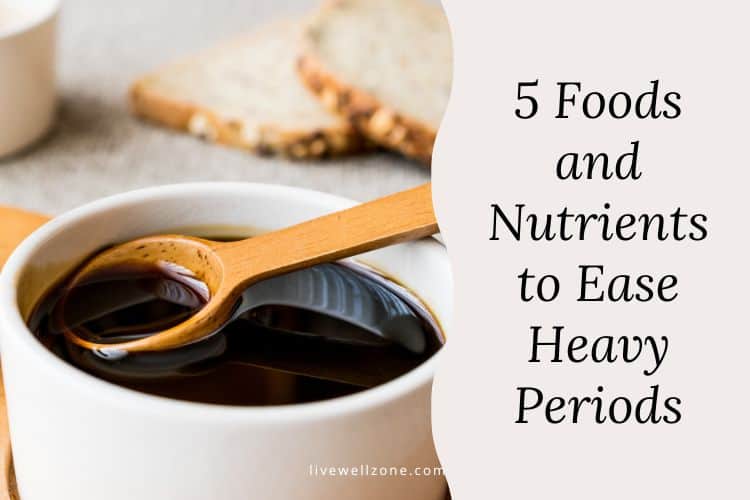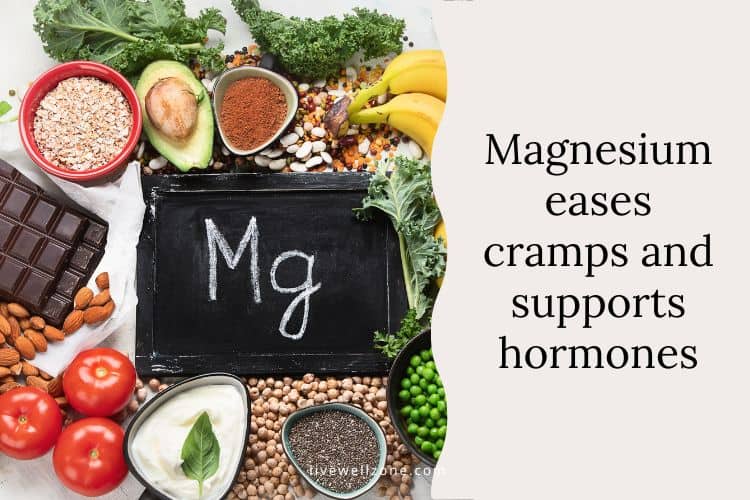
Heavy periods are exhausting, messy and sometimes, downright scary.
It’s not just because of the blood loss. There’s also painful cramps, fatigue, increased risk of anemia and hormonal imbalance to worry about.
As overwhelming as all of this is, there are nutritional strategies that you can lean on to support a healthy flow.
In this article, we’ll dive into five foods and nutrients to get you started. By the end of this article, you’ll learn:
- How blackstrap molasses can be used as a source of critical nutrients like iron, magnesium, and B-vitamins.
- Why vitamin C strengthens capillaries and boosts iron absorption.
- The role of vitamin K in blood clotting and estrogen metabolism.
- The importance of including iron-rich foods in your diet.
- How magnesium support hormones and your cycle.
Let’s take a closer look at how these nutritional remedies can help transform your cycle.
Side note: some of the information in this article is drawn from a scientific review on nutrition and gynecology, which you can find here.
1. Blackstrap Molasses
Blackstrap molasses is a powerhouse of nutrients that some women use as a home remedy for menstrual irregularities.
Unlike regular sugar, which has zero nutrients, blackstrap molasses contains nutrients like magnesium, iron and B-vitamin (all of which are critical for menstrual health).
Let’s take a closer look at each nutrient.
Rich in Magnesium
Just one tablespoon of blackstrap molasses provides 12% of the daily recommended intake of magnesium.
This mineral plays a role in balancing prostaglandins, which are hormones that can contribute to excessive bleeding and cramps when elevated.
Contains B-Vitamins
B-vitamins play a key role in supporting liver function, which is essential for detoxifying excess estrogen.
This matters for two reasons:
- chronic vitamin B deficiency has been linked to increased bleeding, as the liver becomes unable to inactivate estrogen effectively.
- too much estrogen leads to a thicker uterine lining. This means when that thick lining sheds, there will be more blood loss.
As a natural source of B-vitamins like B1, B2 and B6, blackstrap molasses can help bring more balance to your body.
Natural Source of Iron
With 20% of the daily recommended intake of iron in just one tablespoon, blackstrap molasses may help prevent anemia (a common side effect of heavy menstruation).
Healthy iron levels aren’t just essential for your energy, they’re also necessary for thyroid function.
You see, the thyroid plays a role in regulating the menstrual cycle.
So, an iron deficiency will impact the thyroid’s ability to regulate your cycle, which can worsen things even more.
To incorporate blackstrap molasses into your routine, try taking one tablespoon per day. You can mix it into water, use it as a sweetener for oatmeal or even take it straight off the spoon.
Just make sure to choose the right type of blackstrap molasses as I explain in this guide on blackstrap molasses and heavy periods.
2. Vitamin C

Vitamin C is another essential nutrient that could make a big difference in the intensity of your flow. It may support the menstrual cycle in two key ways:
Strengthens Capillaries
Fragile capillaries can contribute to significant blood loss during your period.
Vitamin C, especially when combined with bioflavonoids, is said to strengthen these tiny blood vessels and reduce excessive bleeding.
In one study, 16 out of 18 women who used vitamin C and bioflavonoids for heavy periods reported significant improvement.
Boosts Iron Absorption
Vitamin C enhances your body’s ability to absorb iron from food and supplements.
This is particularly important for anyone experiencing heavy blood loss, as low iron levels can contribute to anemia and hormonal imbalances.
You can get vitamin C from foods like oranges, bell peppers, and strawberries.
Alternatively, consider a vitamin C supplement that includes bioflavonoids for maximum benefit.
Not sure how much to take or which supplement to choose? Read this guide on vitamin C for heavy periods.
3. Vitamin K
Although it’s often overlooked, vitamin K is essential for healthy menstrual cycles.
This fat-soluble vitamin plays a dual role in supporting both blood clotting and hormone balance.
- Blood Clotting: Vitamin K is necessary for the production of proteins that regulate blood clotting. If you’re bleeding excessively because of a defect in the blood clotting process, then this vitamin may be helpful.
- Estrogen Metabolism: Research suggests that vitamin K influences estrogen metabolism. Since excess estrogen is an underlying factor in heavy periods, this vitamin can be a friendly ally.
To ensure you’re getting enough vitamin K, focus on foods like:
- kale
- spinach
- broccoli
- fermented foods
For more on this important vitamin, read my guide on vitamin K and heavy menstrual bleeding.
4. Iron-Rich Foods
Maintaining healthy iron levels is essential for:
- preventing anemia.
- replenishing blood lost during heavy periods.
When it comes to food, there are two types of iron:
- Heme Iron: Heme iron is found in animals and it is more easily absorbed by the body. Some foods that provide heme iron include red meat (grass fed and grass finished is best), poultry, fish, and organ meats.
- Non-Heme Iron: Non-heme iron is found in plants like spinach, lentils, chickpeas, beans, quinoa, nuts and seeds. To boost the absorption of non-heme iron, pair these foods with vitamin C-rich options such as citrus fruits, tomatoe, or bell peppers.
Other sources of iron to consider:
- Brewer’s yeast
- wheat germ
- dates
- apricots
- raisins
- yogurt
- sour fruits
- citrus juices (fresh pressed, not the stuff in the grocery store that has little to no vitamin C)
Consuming a mix of heme and non-heme iron sources is a good way to maintain optimal iron levels.
5. Magnesium

Magnesium is another vital mineral for menstrual health. While there isn’t a lot of information specifically about magnesium and heavy menstruation, this mineral is known for playing an important role in hormone balance and for alleviating cramps.
So it’s worth paying attention to this nutrient as you work on easing excessive bleeding.
To increase your magnesium intake, reach for foods like:
- almonds
- cashews
- sunflower seeds
- spinach
- Swiss chard
- avocados
- bananas
- cacao powder or dark chocolate (at least 70% cocoa)
Magnesium supplements are also an option, especially if you find it difficult to meet your needs through food alone.
Magnesium glycinate and magnesium citrate are popular supplement forms known for their high absorption rates and gentle effects on the digestive system.
Your Next Steps for a Lighter, Healthier Cycle
These five nutritional remedies are an excellent starting point for managing heavy periods naturally.
Whether it’s the iron-rich boost from blackstrap molasses, the capillary-strengthening effects of vitamin C or vitamin K’s blood clotting properties, these nutrients work together to support a healthier cycle.
Adding iron-rich and magnesium-rich foods to your routine with further amplify these benefits, giving your body the raw material it needs to thrive.

You Might Also Enjoy:
Eating Dates For Iron Deficiency: Benefits, How Many To Eat and Best Types

